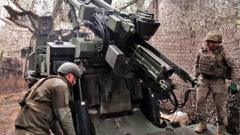Big plumes of smoke rise in the distance as Ukrainian drones capture live footage from the battleground near Pokrovsk, a crucial area of ongoing conflict in Eastern Ukraine. The battle has intensified, with Ukrainian artillery targeting Russian positions in an effort to repel their advances. “It’s chilling to watch,” says a soldier known as Kozak, emphasizing the heavy toll of the war that has claimed countless lives.
The situation presents a stark contrast to six months prior, as the destruction of homes and infrastructure has escalated. Yet among the chaos, there's a glimmer of hope. With recent diplomatic movements encouraging talks between Ukrainian and Russian leaders, a sentiment of cautious optimism is emerging among troops on the ground. “I want to believe this would be the beginning of the end of the war,” Kozak adds, highlighting a significant shift following years without communication.
Yurii, another soldier, echoes a similar hope but remains skeptical, emphasizing that Ukraine cannot be held accountable for the war's outbreak: “Us soldiers, we wish this war would end. But it’s important to remember that we cannot stop it because we did not start it.” As UAVs become more common, the evolving technology of warfare introduces new threats on the battlefield.
Back at their artillery position, the soldiers rely heavily on precisely engineered French-made self-propelled artillery guns, known as the "Caesar." These weapons have proven effective in enhancing their operational capabilities. “It is much more effective than the old Soviet equipment I’ve used,” Kozak notes as they prepare for another round of firing amidst incoming enemy shells.
Despite the challenges and exhaustion, troops remain resolute. Kozak reflects on the discussion surrounding potential territorial concessions for peace. “It’s painful to hear that,” he shares sorrowfully, emphasizing the sacrifices made by so many soldiers: “We shouldn’t give up a single metre of our land.”
Outside the battlefield, the emotional scars of the war linger heavily. Yana Stepanenko travels to her son Vladislav's grave in Zaporizhzhia, leaving his favorite treats at the site where he was laid to rest after being killed in a Russian strike. Tears fill her eyes as she expresses doubt about the peace talks, amidst concerns that Russia's ambitions for Ukraine will never cease.
“No way. I want to live in Ukraine, not Russia,” she states resolutely, recalling the atrocities faced under occupation. “I hope my child did not die for nothing, that there will still be a victory and all of Ukraine will become free.”
As the conversation around possible peace negotiations grows, both soldiers and civilians remain united in their desire for a resolution, yet wary of the sacrifices that would have to be made along the way.
The situation presents a stark contrast to six months prior, as the destruction of homes and infrastructure has escalated. Yet among the chaos, there's a glimmer of hope. With recent diplomatic movements encouraging talks between Ukrainian and Russian leaders, a sentiment of cautious optimism is emerging among troops on the ground. “I want to believe this would be the beginning of the end of the war,” Kozak adds, highlighting a significant shift following years without communication.
Yurii, another soldier, echoes a similar hope but remains skeptical, emphasizing that Ukraine cannot be held accountable for the war's outbreak: “Us soldiers, we wish this war would end. But it’s important to remember that we cannot stop it because we did not start it.” As UAVs become more common, the evolving technology of warfare introduces new threats on the battlefield.
Back at their artillery position, the soldiers rely heavily on precisely engineered French-made self-propelled artillery guns, known as the "Caesar." These weapons have proven effective in enhancing their operational capabilities. “It is much more effective than the old Soviet equipment I’ve used,” Kozak notes as they prepare for another round of firing amidst incoming enemy shells.
Despite the challenges and exhaustion, troops remain resolute. Kozak reflects on the discussion surrounding potential territorial concessions for peace. “It’s painful to hear that,” he shares sorrowfully, emphasizing the sacrifices made by so many soldiers: “We shouldn’t give up a single metre of our land.”
Outside the battlefield, the emotional scars of the war linger heavily. Yana Stepanenko travels to her son Vladislav's grave in Zaporizhzhia, leaving his favorite treats at the site where he was laid to rest after being killed in a Russian strike. Tears fill her eyes as she expresses doubt about the peace talks, amidst concerns that Russia's ambitions for Ukraine will never cease.
“No way. I want to live in Ukraine, not Russia,” she states resolutely, recalling the atrocities faced under occupation. “I hope my child did not die for nothing, that there will still be a victory and all of Ukraine will become free.”
As the conversation around possible peace negotiations grows, both soldiers and civilians remain united in their desire for a resolution, yet wary of the sacrifices that would have to be made along the way.




















